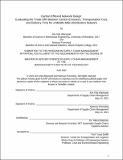Carbon Efficient Network Design: Evaluating The Trade-Offs Between Carbon Emissions, Transportation Cost and Delivery Time For a Middle-Mile Distribution Network
Author(s)
Alamsyah, Ars-Vita; Purevdorj, Namuun
DownloadSupply Chain Management capstone research project (1.911Mb)
Terms of use
Metadata
Show full item recordAbstract
The transportation sector is the third largest contributor to greenhouse gas (GHG) emissions, accounting for over 28% of total U.S. emissions and over 14% of global emissions in 2018. As climate change and its negative effects have grown significantly, efforts to reduce GHG emissions have become an important objective on a global, national, and corporate scale. One approach is to design a distribution network that minimizes transportation carbon emissions while meeting its primary Key Performance Indicators (KPI). It is important for companies to understand the trade-offs between those KPIs, which may include minimizing the carbon footprint, minimizing transportation costs, and meeting the network's delivery time requirements. This research introduces a multi-echelon Green facility location problem (FLP) that focuses on the middle-mile. It incorporates intermodal and alternative-fuel transportation modes and optimizes for the tri-objective of variable transportation cost, delivery time and carbon emissions. By using the ɛ-constraint method, Pareto frontiers for carbon emissions vs. cost and carbon emissions vs. delivery time were plotted, providing the trade-offs between objectives. Optimal scenarios on the Pareto frontiers were identified to align with 1.5oC and well-below 2oC global climate scenarios according to the Science-Based Targets initiatives. The research team found that the trade-offs between carbon emissions vs. delivery time are non-linear and much more significant than carbon emissions vs. transportation variable cost. In order for firms to reach Science-Based Targets, it is necessary for companies that have transportation heavy operations with short delivery timelines to shift all transportation to vehicles powered by lower carbon fuels. This research informs the approach to start incorporating environmental considerations in the strategic decision-making process for supply chain network design.
Date issued
2021-06-16Keywords
Network Design, Sustainability, Transportation
Collections
The following license files are associated with this item: